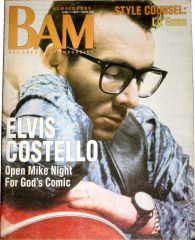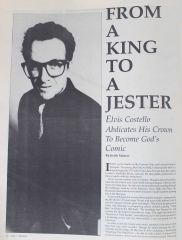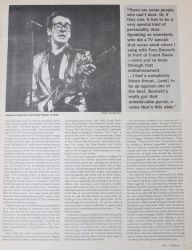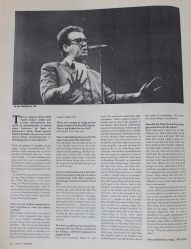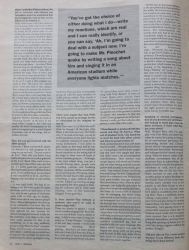BAM, April 7, 1989: Difference between revisions
(formatting +image links) |
(+text part 2) |
||
| (2 intermediate revisions by the same user not shown) | |||
| Line 4: | Line 4: | ||
{{:California publications index}} | {{:California publications index}} | ||
{{Bibliography article header}} | {{Bibliography article header}} | ||
<center><h3> From a king | <center><h3> From a king to a jester </h3></center> | ||
---- | ---- | ||
<center> Keith Moerer </center> | <center> Keith Moerer </center> | ||
---- | ---- | ||
'''Elvis Costello abdicates his crown to become god's comic | '''Elvis Costello abdicates his crown to become god's comic | ||
{{Bibliography text}} | |||
I didn't see the Beatles at the Caravan Club, and I missed Dylan at Newport. Too young. But I like to think I witnessed the birth of a musical legend in 1977 when I sat, knees five feet from the stage at London's Nashville Room, and saw the first public performance of Elvis Costello with the Attractions. | |||
It was a good summer to be in London. Though I arrived too late to catch the Sex Pistols and Clash (both touring Europe), I did see early shows by X-Ray Spex, the Adverts, the Jam (this took crawling through the bathroom window of the Battersea Town Hall), the Police, the Boomtown Rats and a dozen others who never made it past the opening slot at the Marquee. | |||
To most of England, it was the Silver Jubilee summer, commemorating the Queen's 25-year reign. To me, and most of the natives I met, it was the summer of punk, pure and simple. That meant hanging out in clubs, and listening to pumped-up sound systems playing "White Riot" or Eddie & the Hot Rods' "Do Anything You Wanna Do" and waiting for the band to stumble on stage. The night the Ramones' "Sheena Is A Punk Rocker" came blasting out of the house speakers to a deafening crowd roar, my chest welled. I was still proud to be an | |||
American. | |||
As often as not, the bands were awful, amateur in the worst rather than best way. Not Costello. Though he raced through his set — virtually all the songs off ''My Aim Is True'' including a hair-raising "Watching The Detectives" — he did so with a kind of annoyed but tuneful assurance. Afterwards, the crowd seemed stunned. Taking the tube back to my hotel, I got into an excited discussion with a couple of spike-haired punks who'd also been at the show. "'E's kinda poonk," said one of them appreciatively, "but not really." His friend nodded, and so did I. We knew exactly what he meant. | |||
Twelve years later I still do. Though angry enough, Costello was a punk mostly by association and the accident of timing. Like a lot of punks he knew how to say "What the fuck"; unlike most of them, he knew how to say it in many musical languages. But in '77 anyone young and in the way was considered a ''poonk'', putting Costello in peculiar company that included Bob Geldof and Sting. If thought about at all, Geldof's now known principally as the unshaven organizer of Live Aid, and Sting's become a talented if humorless bore, rich enough to buy the talented jazz band he probably dreamed about, even in '77. I don't know what happened to the Adverts (their one standout single, "Gary Gilmore's Eyes," is about a guy who wakes up after surgery to find himself looking through the donated eyes of a murderer), but Paul Weller has mutated into a crooner of elegant socialist soul, while Poly Styrene of X-Ray Spex ("Oh, Bondage, Up Yours") changed her name and joined the Hare Krishnas (yours, too). John Lydon and Mick Jones have fared better than most but Costello, virtually alone among the Brit class of '77, has continued to make music that truly matters. | |||
A great songwriter, Costello has proven himself to be a shrewd disciple of American soul, country, blues, folk, and Tin Pan Alley pop. For every failed experiment — the schlock country of ''Almost Blue'', the over-active cleverness of ''Goodbye Cruel World'', the tired punk wail of ''Blood & Chocolate'' — Costello has delivered three good albums, some — ''This Year's Model'', ''Imperial Bedroom'', ''King Of America'' — true masterpieces. | |||
Add to these the newly released Spike, an album recorded with help from some of the rock's biggest names (Paul McCartney, Chrissie Hynde) and many underappreciated talents (the Dirty Dozen Brass Band, T Bone Burnett, Allen Toussaint, Donal Lunny, and Marc Ribot). The results are frequently stunning: "Tramp The Dirt Down," a beautiful if scaldingly bitter attack on Margaret Thatcher; "This Town," a playful poke at the cult of entrepreneurship; "Deep Dark Truthful Mirror," a successful melding of classic New Orleans r&b (Toussaint) with modern Crescent City sounds (the Dirty Dozens); and "God's Comic," jazz-inflected pop sure to incite fundamentalist ire for its depiction of the Almighty as a long-haired lover of trash culture. | |||
Never the most cooperative interview subject, I'd been assured that Costello was more relaxed and amenable than in the past. Meeting him, between a battery of San Francisco radio station visits in mid-February, I found this mostly to be true. But Costello can still be brittle and brisk, cranky when asked an innocent question the wrong way, or faintly dismissive when a subject doesn't interest him. Asked if Spike Jones, supposedly the inspiration for the new album's title, was truly a comic influence, Costello offered obfuscation in place of a straight answer: "I think Spike Jones is a constant inspiration to everyone in this time of woe and trouble. But it could just as easily be said that [the album] is named after the bulldog in ''Tom And Jerry'' — he's called Spike. Or the railroad spike that was struck... It's just the name of the record, that's what it's ''called''. But I suppose it did come out of a conversation about Spike Jones..." I see. Next question... | |||
In general, though, Costello was forthcoming and surprisingly modest in discussing his work with Roy Orbison, his newfound appreciation of Bruce Springsteen, the joy of writing incidental music for a movie (''The Courier''), his assessment of new traditionalist country singers, the oddball studio habits of his collaborators, his disdain for corporate sponsorships, and the horror of being blown off the same stage by both Tony Bennett and Count Basie. | |||
The discussion of politics was a more prickly, if frequently interesting, subject. Though Costello has written songs with an undeniable political bent since 1977 ("Less Than Zero" being a pointed attack on the rise of British fascism), and has spent the better part of this decade directly or indirectly bashing the policies of Maggie Thatcher ("Pills And Soap," "Shipbuilding," "Peace In Our Time"), he refuses to wear the mantle of "political songwriter," preferring to offer his views as a personal response to publicly violated trust. Fair enough — this helps explain his cynical view of large scale benefits like Amnesty International and Freedomfest — but he also bristles at the suggestion that the anti-English sentiments he's expressed so often had anything to do with his recent move from London to Dublin. Ridiculous, he insists — a move is as simple as packing up the furniture and sleeping in a new bedroom... | |||
The interview itself was conducted in the lobby lounge of the Four Seasons Clift, a swank San Francisco hotel with thick carpets and an officious staff. When I arrived, I was informed by a Warner Bros. publicist that Elvis was not in his room, but would — the assurance seemed a little shaky — show up any minute. I was also told that Costello had asked that his wife, former Pogues bassist Cait O'Riordan, be present throughout the interview. Almost as if on cue, the two of them strode through the hotel's lobby, unnoticed and unaccosted. Both were dressed in black, though Costello accented his dark trench coat and pants with a hideous floral print shirt and a day or two's worth of scraggly stubble. After settling into a trio of overstuffed sofas and ordering a pot of coffee — which Costello graciously refused a waiter's assistance in pouring — I began asking questions. Tested and occasionally challenged by Costello, the proceedings were watched, in a sense refereed, by O'Riordan, who said nothing but broke into a laugh once or twice, and wore the bemused half-smile of a cat, along with dark glasses that hid her eyes. | |||
{{cx}} | |||
{{rttc}} | |||
{{tags}}[[Spike]] {{-}} [[The Beatles]] {{-}} [[Bob Dylan]] {{-}} [[Newport Folk Festival|Newport]] {{-}} [[Concert 1977-08-07 London|Nashville Rooms]] {{-}} [[The Attractions]] {{-}} [[The Sex Pistols]] {{-}} [[The Clash]] {{-}} [[The Jam]] {{-}} [[The Police]] {{-}} [[Boomtown Rats]] {{-}} [[My Aim Is True]] {{-}} [[Watching The Detectives]] {{-}} [[Bob Geldof]] {{-}} [[Sting]] {{-}} [[Concert 1985-07-13 London|Live Aid]] {{-}} [[Sting]] {{-}} [[Paul Weller]] {{-}} [[John Lydon]] {{-}} [[Mick Jones]] {{-}} [[Tin Pan Alley]] {{-}} [[Almost Blue]] {{-}} [[Goodbye Cruel World]] {{-}} [[Blood & Chocolate]] {{-}} [[This Year's Model]] {{-}} [[Imperial Bedroom]] {{-}} [[King Of America]] {{-}} [[Paul McCartney]] {{-}} [[Chrissie Hynde]] {{-}} [[Dirty Dozen Brass Band]] {{-}} [[T{{nb}}Bone Burnett]] {{-}} [[Allen Toussaint]] {{-}} [[Donal Lunny]] {{-}} [[Marc Ribot]] {{-}} [[Tramp The Dirt Down]] {{-}} [[Margaret Thatcher]] {{-}} [[...This Town...|This Town]] {{-}} [[Deep Dark Truthful Mirror]] {{-}} [[God's Comic]] {{-}} [[Roy Orbison]] {{-}} [[Bruce Springsteen]] {{-}} [[The Courier]] {{-}} [[Tony Bennett]] {{-}} [[Count Basie]] {{-}} [[Less Than Zero]] {{-}} [[Pills And Soap]] {{-}} [[Peace In Our Time]] {{-}} [[Shipbuilding]] {{-}} [[Concert 1986-06-28 London|Freedomfest]] {{-}} [[Warner Bros.]] {{-}} [[The Pogues]] {{-}} [[Cait O'Riordan]] | |||
{{cx}} | |||
{{Bibliography text 0}} | {{Bibliography text 0}} | ||
| Line 31: | Line 66: | ||
''You've collaborated with a lot of different musicians in the past. As far as collaborating with other songwriters, though, you haven't done a lot of that. | ''You've collaborated with a lot of different musicians in the past. As far as collaborating with other songwriters, though, you haven't done a lot of that. | ||
I've never done one long sort of songwriting job with somebody like this was. The brief was to write for his record; now by coincidence I brought some material so we had a starting point and he had a song to work on in a similar sort of way. I think we were both aware of the fact that we might just sit there and stare at each other, waiting for the inspiration to strike, and wouldn't that have been | I've never done one long sort of songwriting job with somebody like this was. The brief was to write for his record; now by coincidence I brought some material so we had a starting point and he had a song to work on in a similar sort of way. I think we were both aware of the fact that we might just sit there and stare at each other, waiting for the inspiration to strike, and wouldn't that have been embarrassing? | ||
''Was there anything you learned from writing with Paul McCartney, in terms of his taking a different approach to songwriting? | ''Was there anything you learned from writing with Paul McCartney, in terms of his taking a different approach to songwriting? | ||
| Line 59: | Line 94: | ||
{{Bibliography images}} | {{Bibliography images}} | ||
[[image:1989-04-07 BAM page 18.jpg| | [[image:1989-04-07 BAM cover.jpg|x240px|Cover.]] | ||
[[image:1989-04-07 BAM page 18.jpg|x240px|Page 18.]] | |||
<br><small>Cover and page scan.</small> | |||
[[image:1989-04-07 BAM page 19.jpg|x250px|Page 19.]] | |||
[[image:1989-04-07 BAM page 20.jpg|x250px|Page 20.]] | |||
<br><small>Page scans.</small> | |||
[[image:1989-04-07 BAM page 22.jpg|x250px|Page 22.]] | |||
[[image:1989-04-07 BAM page 24.jpg|x250px|Page 24.]] | |||
<br><small>Page scans.</small> | <br><small>Page scans.</small> | ||
<small> | <small>Page scan.</small><br> | ||
[[image:1989-04-07 BAM page 25.jpg|x250px|Page 25.]] | |||
[[image:1989-04-07 BAM page | |||
{{Bibliography notes footer}} | {{Bibliography notes footer}} | ||
Latest revision as of 11:24, 17 April 2024
|
